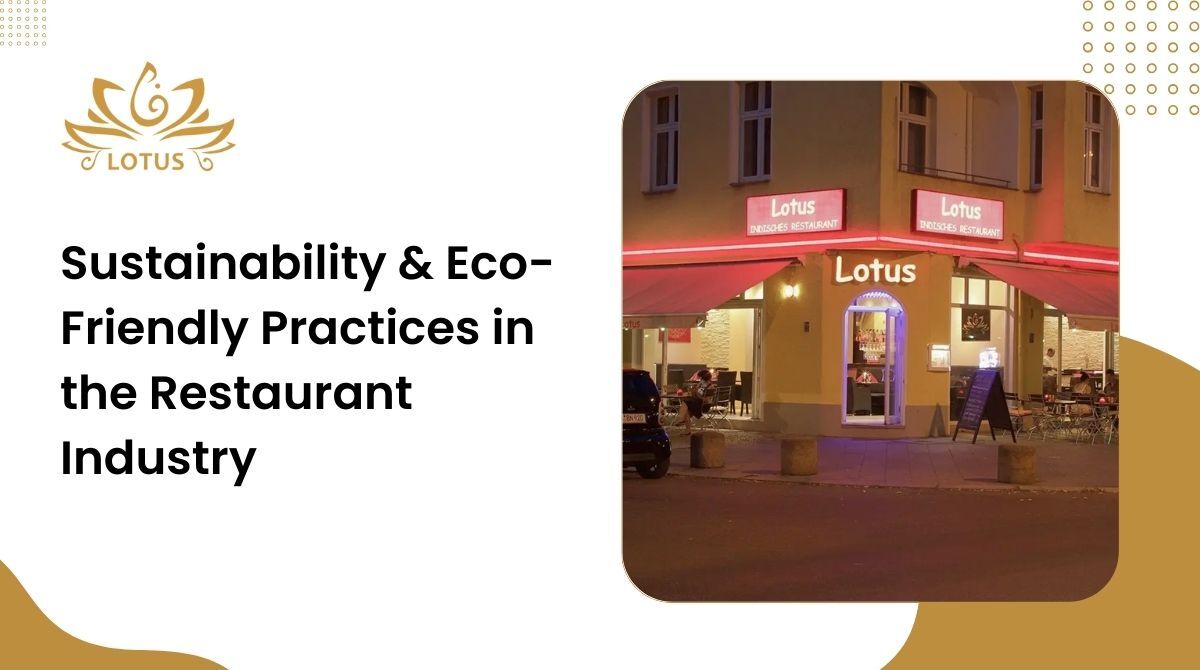As the world becomes more environmentally conscious, sustainability has become a central focus across all industries. The restaurant sector is no exception, with many businesses turning to eco-friendly practices in order to minimize their environmental impact. Whether it’s sourcing ingredients responsibly, reducing waste, or creating a sustainable dining experience, the commitment to sustainability has a positive effect on both the environment and the customer experience. In this blog, we’ll explore why sustainability is essential for the restaurant industry and how eco-friendly practices are transforming the way we dine.

Why Sustainability Matters for Restaurants
Sustainability in the restaurant industry encompasses a wide range of practices aimed at reducing waste, conserving resources, and promoting environmental responsibility. Restaurants are among the largest consumers of energy, water, and raw materials, and they also produce significant amounts of waste. By adopting more sustainable practices, restaurants can contribute to reducing the carbon footprint and lessen their impact on natural resources. Additionally, consumers today are more conscious of how their food is sourced and prepared, and they are increasingly drawn to businesses that prioritize sustainability.
Sourcing Local and Organic Ingredients
One of the key eco-friendly practices is sourcing ingredients locally and organically. By choosing local farmers and suppliers, restaurants not only support the local economy but also reduce the carbon footprint associated with long-distance food transportation. Local ingredients are typically fresher, more flavorful, and require fewer preservatives, which means less food waste.
Organic farming practices also help protect the environment by reducing the need for synthetic pesticides and fertilizers, thus preserving soil health and biodiversity. As a result, more restaurants are incorporating farm-to-table menus that emphasize organic and locally sourced products, benefiting both the environment and their guests.
Reducing Food Waste
Food waste is a significant environmental issue, with millions of tons of edible food being discarded each year. In the restaurant industry, excess food waste contributes to the depletion of resources and environmental pollution. Implementing food waste reduction strategies can have a major positive impact.
Some effective ways to minimize food waste include portion control, repurposing leftovers into new dishes, composting organic waste, and donating surplus food to charities. Additionally, offering guests smaller portion sizes or allowing them to customize their meals can help reduce plate waste.
Eco-Friendly Packaging
In an era where takeout and delivery services are more popular than ever, restaurants are opting for eco-friendly packaging to reduce plastic waste. Biodegradable, recyclable, and compostable packaging options are now widely available, making it easier for restaurants to minimize their environmental impact.
Switching to eco-friendly takeout containers, straws, and utensils helps reduce the use of single-use plastics that contribute to pollution. By offering reusable packaging or incentivizing customers to bring their own containers, restaurants can create a more sustainable dining experience for their patrons.
Energy and Water Efficiency
Restaurants are high consumers of energy and water, both of which can have significant environmental impacts. By adopting energy-efficient appliances, LED lighting, and low-water-use fixtures, restaurants can reduce their consumption and lower their carbon footprint.
Some restaurants are even taking it a step further by using renewable energy sources, such as solar panels or wind energy, to power their operations. These measures not only reduce environmental harm but also result in long-term savings for the business.
Supporting Fair Trade and Ethical Practices
Ethical sourcing is another important aspect of sustainability. By choosing to work with suppliers who follow fair trade practices, restaurants ensure that the workers involved in producing food are paid fairly and work in safe conditions. This practice fosters greater transparency and social responsibility within the supply chain.
Supporting ethical farming methods, such as those that promote animal welfare and avoid factory farming practices, also aligns with sustainability goals. As customers become more socially conscious, restaurants that prioritize fair trade and ethical sourcing are building a loyal customer base that shares these values.
Lotus Restaurant’s Commitment to Sustainability
At Lotus Restaurant in Berlin, sustainability is at the heart of everything we do. Our commitment to eco-friendly practices can be seen in every aspect of our operations, from the ingredients we source to the way we prepare and serve our meals. We proudly support local farmers and suppliers who share our values of quality and sustainability, ensuring that every dish we serve is fresh, flavorful, and responsibly sourced.

Our menu features a range of seasonal, organic ingredients that are both environmentally friendly and delicious. We make a conscious effort to minimize food waste by carefully planning our portions and utilizing any leftover ingredients in creative ways. Additionally, we offer eco-friendly takeout packaging and encourage our guests to bring their own containers for takeout, further reducing waste.
In our commitment to conserving resources, we have also implemented energy-efficient lighting and appliances throughout the restaurant. We believe that making small, sustainable changes can have a big impact on our planet—and we’re proud to lead the way in providing a dining experience that’s as eco-friendly as it is enjoyable.
Conclusion
Sustainability and eco-friendly practices are becoming an integral part of the modern restaurant landscape. As more diners seek out restaurants that prioritize environmental responsibility, adopting sustainable practices can set a restaurant apart and foster a loyal customer base. From sourcing local, organic ingredients to reducing food waste and embracing eco-friendly packaging, there are many ways for restaurants to contribute to a healthier planet. At Lotus Restaurant in Berlin, we’re proud to be part of this movement, ensuring that our guests enjoy not only a delicious meal but also one that supports a more sustainable and ethical food system.
At Lotus Restaurant, we are committed to sustainability and eco-friendly practices in the restaurant industry. From sourcing local and organic ingredients to minimizing waste, our efforts contribute to a healthier planet and a delightful dining experience.
Stay connected with us on social media:
- Instagram: @lotusberlin
For more insights into sustainable dining, visit Foodmato.

